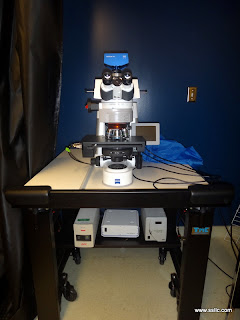Eli Lilly and Company: Alzheimer's Drug Disappoints in Trials
IINDIANAPOLIS, Aug. 24, 2012 /PRNewswire/ -- Eli Lilly and
Company (NYSE: LLY) today announced that the primary endpoints, both cognitive
and functional, were not met in either of the two Phase 3, double-blind,
placebo-controlled solanezumab EXPEDITION trials in patients with
mild-to-moderate Alzheimer's disease. However, a pre-specified secondary
analysis of pooled data across both trials showed statistically significant
slowing of cognitive decline in the overall study population of patients with
mild-to-moderate Alzheimer's disease. In addition, pre-specified secondary
subgroup analyses of pooled data across both studies showed a statistically
significant slowing of cognitive decline in patients with mild Alzheimer's
disease, but not in patients with moderate Alzheimer's disease.
Adverse events with an incidence of at least 1 percent that
occurred statistically significantly more in the solanezumab group than in the
placebo group were lethargy, rash and malaise (in EXPEDITION1) and angina (in
EXPEDITION2).
An ongoing, open-label extension study, EXPEDITION-EXT, is
fully enrolled and will continue as planned.
"We recognize that the solanezumab studies did not meet
their primary endpoints, but we are encouraged by the pooled data that appear
to show a slowing of cognitive decline," said John C. Lechleiter, Ph.D.,
chairman, president and chief executive officer, Lilly. "We intend to
discuss these data with regulatory authorities to gain their insights on
potential next steps."
"Lilly is committed to finding medicines that alter the
underlying pathology of Alzheimer's disease for the benefit of patients and
their loved ones," said Jan Lundberg, Ph.D., executive vice president,
science and technology, and president, Lilly Research Laboratories. "We
believe the pooled data support the amyloid hypothesis, as these are the first
Phase 3 data with an anti-beta amyloid agent that appear to show a slowing of
cognitive decline."
An independent analysis of the data from the EXPEDITION
studies is being performed by the Alzheimer's Disease Cooperative Study (ADCS),
an academic national research consortium that facilitates the discovery,
development and testing of new drugs for the treatment of Alzheimer's disease.
ADCS will present their findings at the American Neurological Association (ANA)
meeting in Boston, Mass., on October 8, 2012, and at the Clinical Trials on
Alzheimer's Disease (CTAD) meeting in Monte Carlo, Monaco, on October 30, 2012.
The next steps for solanezumab have not yet been decided and
will be determined after discussions with regulators.
About the clinical trial endpoints for the EXPEDITION
studies
The EXPEDITION1 study did not meet co-primary cognitive and
functional endpoints in the overall mild-to-moderate patient population;
however, pre-specified secondary subgroup analyses in patients with mild
Alzheimer's disease showed a statistically significant reduction in cognitive
decline. Based on those results, Lilly modified the statistical analysis plan
(SAP) for EXPEDITION2 prior to database lock to specify a single primary
endpoint of cognition in the mild patient population. This revised primary
endpoint did not achieve statistical significance. In both of the EXPEDITION
study protocols, mild Alzheimer's disease was defined as a baseline Mini-Mental
Status Examination (MMSE) score of 20 to 26 and moderate Alzheimer's disease
was defined as a baseline MMSE score of 16 to 19.
About solanezumab and the EXPEDITION studies
Solanezumab is a monoclonal antibody being studied as a
potential therapy for Alzheimer's disease.
The two, Phase 3 double-blind, placebo-controlled
solanezumab EXPEDITION clinical trials included more than 2,050 patients with
mild-to-moderate Alzheimer's disease in 16 countries around the world. The
trials were 18-months in duration.
About Alzheimer's disease
Alzheimer's disease, the most common form of dementia,
causes progressive decline in memory and other aspects of cognition.(1),(2)
Researchers do not know exactly what causes Alzheimer's disease and there are
currently no approved treatments shown to slow the progression of this
devastating disease, only treatment options that reduce certain symptoms of the
disease.(1),(2),(3) Alzheimer's Disease International (ADI) estimates that
there are currently 35.6 million people with dementia worldwide, with 7.7 million
new cases each year (which implies one new case every four seconds).(4) The
number of people affected is estimated to be over 115 million by 2050.(4)
Estimates vary, but experts suggest that as many as 5.4 million Americans may
have Alzheimer's disease.(2)
About Eli Lilly and Company
Lilly, a leading innovation-driven corporation
is developing a growing portfolio of pharmaceutical products by applying the
latest research from its own worldwide laboratories and from collaborations
with eminent scientific organizations. Headquartered in Indianapolis, Ind.,
Lilly provides answers through medicines and information for some of the
world's most urgent medical needs. Additional information about Lilly is
available at www.lilly.com. P-LLY









.jpg)

















